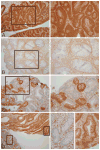SMAD4 immunohistochemistry reflects genetic status in juvenile polyposis syndrome
- PMID: 20682711
- PMCID: PMC2921472
- DOI: 10.1158/1078-0432.CCR-10-0168
SMAD4 immunohistochemistry reflects genetic status in juvenile polyposis syndrome
Abstract
Purpose: Juvenile polyposis syndrome (JPS) can be caused by a germline defect of the SMAD4 gene. Somatic inactivation of SMAD4 occurs in pancreatic and colorectal cancers and is reflected by loss of SMAD4 immunohistochemistry. Here, SMAD4 immunohistochemistry as a marker of SMAD4 gene status and the role of SMAD4 in the adenoma-carcinoma sequence in neoplastic progression in JPS are studied.
Experimental design: Twenty polyps with a SMAD4 germline defect and 38 control polyps were studied by SMAD4 immunohistochemistry. Inactivation of the SMAD4 wild-type allele was studied in dysplastic epithelium and in areas with aberrant SMAD4 expression. APC, beta-catenin, p53, and K-ras were studied to evaluate the adenoma-carcinoma sequence.
Results: Nine of 20 polyps with a SMAD4 germline defect showed loss of epithelial SMAD4 expression. Loss of heterozygosity of SMAD4 was found in five polyps and a somatic stop codon mutation was found in two polyps without loss of heterozygosity. Remarkably, somatic inactivation of epithelial SMAD4 did not always coincide with dysplasia and aberrant p53 staining was found in four of six dysplastic polyps with normal SMAD4 staining. One K-ras mutation was found in nine juvenile polyps with dysplasia. No evidence for Wnt activation was found.
Conclusions: SMAD4 immunohistochemistry mirrors genetic status and provides a specific adjunct in the molecular diagnosis of JPS. However, epithelial SMAD4 inactivation is not required for polyp formation and is not obligatory for neoplastic progression in JPS. Instead, different routes to neoplasia in JPS caused by germline SMAD4 mutation seem to be operative, including somatic loss of SMAD4 and p53 inactivation without somatic loss of SMAD4.
Conflict of interest statement
Figures


Similar articles
-
Histologic variations in juvenile polyp phenotype correlate with genetic defect underlying juvenile polyposis.Am J Surg Pathol. 2011 Apr;35(4):530-6. doi: 10.1097/PAS.0b013e318211cae1. Am J Surg Pathol. 2011. PMID: 21412070 Free PMC article.
-
Juvenile polyposis syndrome might be misdiagnosed as familial adenomatous polyposis: a case report and literature review.BMC Gastroenterol. 2020 Jun 1;20(1):167. doi: 10.1186/s12876-020-01238-7. BMC Gastroenterol. 2020. PMID: 32487124 Free PMC article. Review.
-
Large genomic deletions of SMAD4, BMPR1A and PTEN in juvenile polyposis.Gut. 2008 May;57(5):623-7. doi: 10.1136/gut.2007.142927. Epub 2008 Jan 4. Gut. 2008. PMID: 18178612
-
Allelic loss at SMAD4 in polyps from juvenile polyposis patients and use of fluorescence in situ hybridization to demonstrate clonal origin of the epithelium.Cancer Res. 2000 May 1;60(9):2477-82. Cancer Res. 2000. PMID: 10811127
-
Role of Smad4 (DPC4) inactivation in human cancer.Biochem Biophys Res Commun. 2003 Jul 11;306(4):799-804. doi: 10.1016/s0006-291x(03)01066-0. Biochem Biophys Res Commun. 2003. PMID: 12821112 Review.
Cited by
-
A Novel SMAD4 Mutation Causing Severe Juvenile Polyposis Syndrome with Protein Losing Enteropathy, Immunodeficiency, and Hereditary Haemorrhagic Telangiectasia.Case Rep Gastrointest Med. 2015;2015:140616. doi: 10.1155/2015/140616. Epub 2015 Feb 1. Case Rep Gastrointest Med. 2015. PMID: 25705527 Free PMC article.
-
Exploring the molecular mechanisms and therapeutic potential of SMAD4 in colorectal cancer.Cancer Biol Ther. 2024 Dec 31;25(1):2392341. doi: 10.1080/15384047.2024.2392341. Epub 2024 Aug 20. Cancer Biol Ther. 2024. PMID: 39164192 Free PMC article. Review.
-
PRMT5 methylating SMAD4 activates TGF-β signaling and promotes colorectal cancer metastasis.Oncogene. 2023 May;42(19):1572-1584. doi: 10.1038/s41388-023-02674-x. Epub 2023 Mar 29. Oncogene. 2023. PMID: 36991117
-
Novel tumor suppressive function of Smad4 in serum starvation-induced cell death through PAK1-PUMA pathway.Cell Death Dis. 2011 Dec 1;2(12):e235. doi: 10.1038/cddis.2011.116. Cell Death Dis. 2011. PMID: 22130069 Free PMC article.
-
Incidental findings in the bowel cancer population screening program: other polyps and malignancies - A nationwide study.Histopathology. 2023 Jan;82(2):254-263. doi: 10.1111/his.14805. Epub 2022 Oct 10. Histopathology. 2023. PMID: 36156277 Free PMC article.
References
-
- Giardiello FM, Offerhaus GJ, Krush AJ, et al. Risk of hepatoblastoma in familial adenomatous polyposis. J Pediatr. 1991;119:766–8. - PubMed
-
- Jass JR, Williams CB, Bussey HJ, Morson BC. Juvenile polyposis--a precancerous condition. Histopathology. 1988;13:619–30. - PubMed
-
- Aaltonen LA, Jass JR, Howe JR. Juvenile Polyposis. In: Hamilton SR, Aaltonen LA, editors. Pathology and Genetics of Tumours of the Digestive System. Lyon: IARC Press; 2000. pp. 130–2.
-
- van Hattem WA, Brosens LA, de Leng WW, et al. Large genomic deletions of SMAD4, BMPR1A and PTEN in juvenile polyposis. Gut. 2008;57:623–7. - PubMed
Publication types
MeSH terms
Substances
Grants and funding
LinkOut - more resources
Full Text Sources
Research Materials
Miscellaneous

